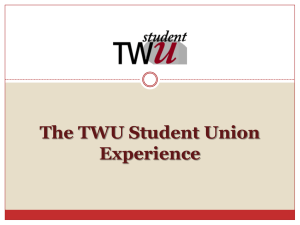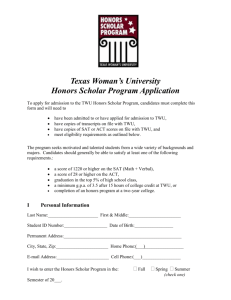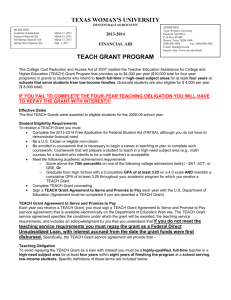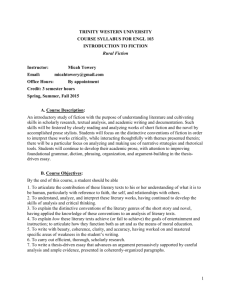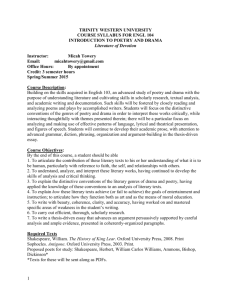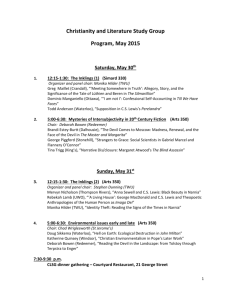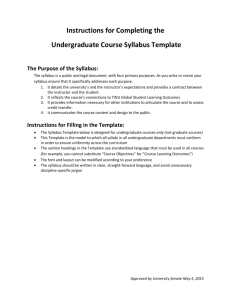CONTENTS ABOUT THE TWU 3 INTRODUCTION 3 KEY MATTERS
advertisement
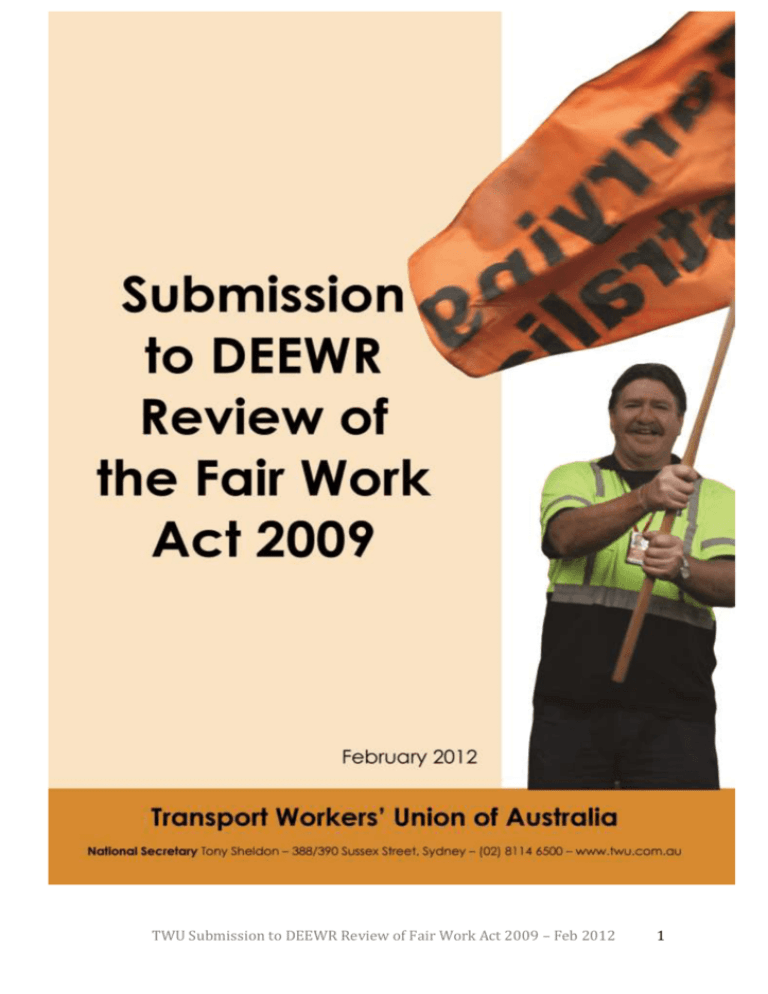
TWU Submission to DEEWR Review of Fair Work Act 2009 – Feb 2012 1 CONTENTS ABOUT THE TWU 3 INTRODUCTION 3 KEY MATTERS FOR CONSIDERATION 4 QANTAS DISPUTE & ACCESS TO ARBITRATION 4 ACCESS TO PROTECTED INDUSTRIAL ACTION 5 NOTICE PERIODS FOR ACTION 6 PROTECTED ACTION BALLOTS 8 RIGHT OF ENTRY 10 GOOD FAITH BARGAINING – ACCESS TO RECORDS 12 CONCLUSION 13 TWU Submission to DEEWR Review of Fair Work Act 2009 – Feb 2012 2 ABOUT THE TRANSPORT WORKERS UNION OF AUSTRALIA The Transport Workers Union of Australia (TWU) represents over 90,000 men and women in Australia’s aviation, road transport, freight logistics, passenger vehicles, waste management, oil, and gas industries. The TWU’s industrial coverage includes individuals who are either self-employed or who are employed directly or contracted to private companies. With over 100 years of experience representing workers in transport and related industries, the TWU has a proud record of standing up to improve fairness and safety at work, and the workplace rights and entitlements of transport workers and their families. The TWU continues to be proactive in establishing efficient industry standards that improve the lives and safety of transport workers, their families, and the general public. INTRODUCTION This submission will focus on the Transport Workers Union of Australia’s concerns with particular aspects of the Fair Work Act 2009, but will not deal with all of the 69 questions put in the Department of Education, Employment and Workplace Relations’ Fair Work Act Review Background Paper. Particular reference will be made to the operation and implications of the Fair Work Act 2009 arising from recent disputes within the TWU’s area of coverage. While this submission will deal with areas and instances of potential improvement to the Fair Work Act, we believe the Act to be significantly and substantially superior to the WorkChoices legislation it replaced – particularly in the areas of general protections and the abolition of Australian Workplace Agreements, which has contributed to significantly fairer workplaces and genuine choices for more workers. The TWU notes and supports the submissions of the Australian Council of Trade Unions, Unions NSW, and TWU state and territory branches. This submission is made on behalf of the Transport Workers Union of Australia, and is supported by all TWU state and territory branches. TWU Submission to DEEWR Review of Fair Work Act 2009 – Feb 2012 3 KEY MATTERS FOR CONSIDERATION QANTAS DISPUTE & ACCESS TO ARBITRATION The stated objectives of the Fair Work Act 2009 include: “achieving productivity and fairness through an emphasis on enterprise-level collective bargaining underpinned by simple good faith bargaining obligations and clear rules governing industrial action...” Unfortunately recent cases – most obviously the QANTAS dispute – suggest that the position is less straightforward than that. The circumstances of the QANTAS dispute over recent months are already notorious, and need not be repeated in this submission. What is abundantly clear from those proceedings is that employers in the position of QANTAS – that is, employers with a public interface – now have the capacity to manipulate the Fair Work Act in order to access arbitration. The interface may be economic, as in the QANTAS dispute, or it might be related to public welfare, as in the Victorian nurses dispute. In either case, an employer who perceives an advantage in arbitration compared to good faith bargaining and who is prepared to risk harm to the economy or to the public will have the option to exit bargaining and enter an arbitration scheme. It is now clear to the TWU that this capacity of many employers to elect between bargaining and arbitration fundamentally undermines the enterprise bargaining scheme and intent of the Fair Work Act, and ought to be addressed. TWU Submission to DEEWR Review of Fair Work Act 2009 – Feb 2012 4 ACCESS TO PROTECTED INDUSTRIAL ACTION It is trite but apparently necessary for this submission point out that that workers have a human right to advance their working conditions by taking industrial action. That characterisation of industrial action as a right reflects the text of the Fair Work Act1, the Explanatory Memorandum to the Fair Work Bill2, Full Bench authority3, and of course international conventions4. The right to access protected action in the Act is substantially identical to the position applying under the WorkChoices iteration of the Workplace Relations Act. That is, it is hedged by numerous caveats and restricted by procedural and other requirements (including the difficulties attendant on protected action ballots described above). It is on one view already inadequate to meet the applicable minimum international standards. The TWU notes question 54 in Attachment B of DEEWR’s Fair Work Act Review Background Paper: “Should applications for protected action ballots be permitted where no majority support determination has been made by FWA, and where the employer has not agreed to collective bargaining”. Presumably this question has been included in response to the substantial media coverage concerning the matters of JJ Richards & Sons Pty Ltd v TWU [2010] FWAFB 9963 and JJ Richards & Sons Pty Ltd v TWU [2011] FWAFB 3377. As is well known, it was argued in those cases that access to protected action is now contingent on an employer’s agreement to bargain, or the majority support of the group of employees to be covered by an agreement. That argument, which was promoted by a range of diverse employer interests who appeared in the proceedings, is not based on any provision of the Act but rather reflects the ideological views of those persons. If accepted, that argument would constitute a seismic shift in Australian industrial relations. If accepted and implemented it would create a barrier to protected industrial action greater than even the worst excesses of Workchoices – and must be rejected for reasons both of principle and practicality. As a practical matter, such a provision would do substantial damage to the system of enterprise bargaining: First, and to state the obvious, it would encourage employers to refuse to bargain, knowing that such refusal would grant at least a temporary, and potentially a permanent, immunity from industrial action; and See the title of Chapter 3, which includes the protected industrial action provisions of the Act “Rights and responsibilities of employees, employers, organisations etc”. 2 Paragraph 1708. 3 See Construction, Forestry Mining and Energy Union v Woodside Burrup Pty Ltd and Kentz E & C Pty Ltd [2010] FWAFB 6021 especially at [37]. 4 See International Labour Organisation Conventions particularly Convention no. 87 Freedom of Association and Protection of the Right to Organise 1948 and Convention No, 98 Right to Organise and Collective Bargaining 1949, both ratified by Australia in 1973. 1 TWU Submission to DEEWR Review of Fair Work Act 2009 – Feb 2012 5 Second, in placing the majority support determination at the heart of the industrial system it is likely to lead to US-style “certification” disputes. Such long, contentious, and expensive disputes would achieve nothing but an increase in animosity between employers and their employees. Such an outcome is to be avoided. The JJ Richards argument invites a wholesale shift in our system of industrial relations in a manner not endorsed by the Fair Work Act nor argued for by any employer, employee, or union prior to the Act’s introduction. It is a political stalking horse pursued at the expense of the employees of JJ Richards, who at the time of the original case, and in the absence of any disposition of the company toward enterprise bargaining, had not received a pay increase for four years. NOTICE PERIODS FOR ACTION This submission has already noted TWU concerns about the operations of the Fair Work Act that might provide, and unfortunately for JJ Richards employees has provided, opportunities for ideologically motivated employers to prosecute ideological arguments at the expense of workplace fairness and equity. Of particular concern to the TWU is the stark imbalance and lack of fairness contained in section 414 of the Act, which requires that employees and unions intending to take employee claim industrial action must provide the employer with at least three full days notice of the action to be taken. TWU Submission to DEEWR Review of Fair Work Act 2009 – Feb 2012 6 The Act does place that same requirement on employers, allowing them to take snap industrial action and manipulate the industrial relations framework to gain advantage over its workers. The consequences are of this imbalance is significant not just for workers but also the national economy, and were demonstrated by QANTAS management’s decision in October 2011 to take snap industrial action, bullying its employees, the community, and threatening the national economy. The full bench of Fair Work Australia found that: “It is unlikely that the protected industrial action taken by the three unions, even taken together, is threatening to cause significant damage to the tourism and air transport industries. The response industrial action of which Qantas has given notice, if taken, threatens to cause significant damage to the tourism and air transport industries and indirectly to industry generally because of the effect on consumers of air passenger and cargo services.5” The TWU contends that the Act should be amended to correct this imbalance, and ensure that employees are treated fairly, and that egregious actions such as those of QANTAS management in October 2011 are not able to occur in future. 5 See FWA Decision B2011/3816 under s424 of the Fair Work Act 2009 TWU Submission to DEEWR Review of Fair Work Act 2009 – Feb 2012 7 PROTECTED ACTION BALLOTS The object of the protected action ballots mechanism of the Fair Work Act is to establish: “a fair, simple and democratic process to allow a bargaining representative to determine whether employees wish to engage in particular protected industrial action”6. This objective is defeated by the conduct of the Australian Electoral Commission (AEC) in protected action ballots. The first difficulty arises from the bias of the AEC toward postal ballots. As a practical matter, the conduct of a ballot by post in a limited timeframe creates a real impediment to achievement of quorum. This is very much the case in the TWU’s experience and is borne out by a comparison of postal ballot returns compared to attendance ballots. In both cases, virtually every ballot proposal receives overwhelming support among those who vote; but in the case of postal ballots, a much lower number of persons vote. Second, the AEC’s process for generating lists of voters is fundamentally unsound. In short, the AEC generates a list of voters by comparing a list provided by the applicant to a list provided by the employer. If an employee does not appear on both lists, or if the employee details (name, address, date of birth, etc) are not identical on the two lists, the employee will not receive a ballot paper. That is, the AEC assumes that each employer will produce full and precisely accurate lists in circumstances where it is contrary to its interests to do so. Third, and perhaps most troubling, the AEC totally refuses to co-operate or even engage in dialogue with applicants during ballots. As a result, applicants have no ability to determine the reasons for problems in conduct of ballots and therefore have a limited capacity to address those problems. These difficulties might be addressed in part by a more proactive involvement of Fair Work Australia in establishing ballot parameters. Unfortunately, FWA has substantially abdicated responsibility for the conduct of the ballots and generally refuses to make any orders regarding conduct of ballots. It is unclear why this is so, given that the Act vests in the Tribunal an apparently broad discretion in framing protected action ballot orders. 6 Section 436 of the Act. TWU Submission to DEEWR Review of Fair Work Act 2009 – Feb 2012 8 Case Study: Transport Workers Union & Toll Pty Ltd protected action ballot (B2010/3750) The facts in the case were as follows: the union’s list of members included some 5,000 employees across Australia; the AEC assigned a single returning officer to deal with the ballot;. of the approximately 2,000 members surveyed by the union over the ballot period, 30% did not receive ballot papers; the AEC refused to provide any information which would allow the union to determine the nature of the problem (whether it arose from problems generating the list, or mailing papers, or otherwise); the AEC refused to engage in any dialogue regarding the problems save by stating that each individual employee should personally contact the returning officer and request a fresh ballot paper; that is, that potentially thousands of employees should individually contact the returning officer, receive papers, complete and return them within the two week period then remaining to complete the ballot; members who contacted the returning officer were told that it was too late to participate given the amount of time needed to send and return ballot papers; the Tribunal subsequently agreed to extend the closing date of the ballot but refused7 to vary the ballot order to include a direction sought by the TWU to the effect that the AEC must “...take all steps reasonably available to ensure that all persons eligible to vote are included on the roll of voters and receive ballot papers. Such steps shall include prompt and proper consideration of, and responses to, matters raised by the applicant for the ballot ”; the union was forced to expend significant resources establishing a call centre, which operated for three weeks checking on ballot papers; the ballot was declared on 2 March 2011. Each form of action was supported by between 84% and 91% of voters. However, despite the union’s heavy investment and the delay of the ballot, only 50.48% of eligible persons voted8. The only option available to a union, in circumstances such as the Toll ballot (Case Study above) and given the refusal of the Tribunal to regulate the AEC, is the highly impractical course of attempting to obtain administrative law remedies requiring the Commission to operate according to its statutory obligations. In other words, there is no remedy available to a union. The combination of factors described creates a significant practical barrier to access protected action, and in turn a significant barrier to employees’ pursuit of improved wages and conditions through enterprise bargaining. 7 8 Decision in transcript at http://www.fwa.gov.au/documents/Transcripts/150211b20103750.htm http://www.fwa.gov.au/documents/industrialballotsresults/twu/twu_20103750.pdf TWU Submission to DEEWR Review of Fair Work Act 2009 – Feb 2012 9 RIGHT OF ENTRY The object of Part 3-4 of the Fair Work Act is to balance the rights of organisations to represent members, hold discussions with potential members, and investigate contraventions of industrial law; and the right of employees to receive information and representation on the one hand, against the right of occupiers and employers to go about their business without undue convenience on the other. This object is not being achieved and has not been observed by the Tribunal in applying the laws. That fact is illustrated by a series of cases including most notably Somerville Retail Services Pty Ltd v AMIEU [2011] FWAFB 120. The TWU’s recent experience was in the matter of TWU v DHL Supply Chain (Australia) Pty Ltd, an application under section 505 of the Act. Case Study: Transport Workers Union v DHL Supply Chain (Australia) Pty Ltd The uncontested facts of the case were as follows: DHL Supply Chain had a long history of antagonism toward the TWU9 and a preference for dealing with a different union10; 9 See TWU v DHL Exel Supply Chain [2008] FMCA 604; TWU v DHL Exel Supply Chain (Australia) Pty Ltd (No.2) [2008] FMCA 920 cited by Commissioner Harrison at [5]. TWU Submission to DEEWR Review of Fair Work Act 2009 – Feb 2012 10 TWU officials who attended the DHL site were directed to a room which was directly opposite and a few metres from the site manager’s office; there was no way for employees to know that a TWU official was in the lunchroom; the national HR manager of DHL Supply Chain attended the site whenever TWU officials attended; the room has space for 5 employees (in the context of a 65 person site) the company did not identify any business reason why the TWU could not attend the lunchroom, save the preference of some employees (recorded in a petition) that the TWU not attend the lunchroom. In TWU v DHL Supply Chain (Australia) Pty Ltd Commissioner Harrison at first instance, and later a majority of a Full Bench held that the direction to attend that room was not unreasonable, despite the fact that the TWU had identified a number of difficulties with the room and that the company had not identified any business reason which required that the TWU be limited to that room. There was no balancing exercise undertaken because the employer did not allege that the direction to use the particular room was necessary to protect its ability to conduct its business. The Tribunal in this case elevated the preference of some employees to a factor of greater weight than the right of organisations to hold discussions with potential members and to represent members. On the basis of the approach in DHL and earlier cases, most notably Somerville, it could not be said that the right of entry provisions in practice involve a balancing of needs of unions and employees against the needs of business. 10 See [40] of the first instance decision. TWU Submission to DEEWR Review of Fair Work Act 2009 – Feb 2012 11 GOOD FAITH BARGAINING – ACCESS TO RECORDS One area of potential utility to both employers and employees is the requirement in section 228(b) of the Act to disclose relevant information. This requirement would potentially resolve deadlocks between employers and employees, particularly in circumstances where employers are or claim to be unable to meet claims for specific economic reasons. Unfortunately the utility of s228(b) is substantially erased by the qualification that the “confidential or commercially sensitive” information need not be disclosed. In practice there is little information which could not be subject to an arguable claim that it is confidential or commercially sensitive. This difficulty is exacerbated by the fact that the meaning of the phrase “confidential or commercially sensitive” is ambiguous. Section 228 should be amended to clarify and confine so it cannot be used to get around the obligation to disclose. TWU Submission to DEEWR Review of Fair Work Act 2009 – Feb 2012 12 CONCLUSION The Fair Work Act 2009 is a significant improvement over the inequitable and harsh WorkChoices legislation it replaced, and has demonstrated its capacity to better ensure fairness and provide employees with protections and rights in the workplaces. The TWU is, however, concerned that particular aspects, as detailed in this submission, are being used by unscrupulous employers to advance an approach of employer militancy and anti-worker actions that were not intended, nor contemplated, in the drafting of the Fair Work Act. As the Prime Minster stated on 31 October 2011: “It's not acceptable to me that we could have a situation where an employer agrees with his or her employees that they are to be paid a certain wage, and then during the life of that agreement, when the employees are obligated to not take industrial action - that's the rules under the Fair Work Act - the employer starts employing contractors at cheaper rates and making those employees redundant. That is not acceptable to me. I can understand that people want to bargain on job security matters11.” Recent industrial tactics and behaviors embarked upon my QANTAS-Jetstar management, with its increasingly militant approach to industrial relations needs addressing in any changes to the Act that might be contemplated. Changes to the Act must serve to strengthen employee rights and limit the ability of employers like QANTAS-Jetstar, and commercial bullies such as Coles and other major retailers, to hold the Australian public, our national economy, and notions of fairness and equity to ransom. The capacity for these employers – whereby management has the legislated capacity to wantonly inflict damage to the national economy in pursuit of ideologically-driven workplace relations practices and a profit-at-any-cost mentality – must be addressed. 11 Transcript of press conference, retrieved 16/2/2011 http://www.pm.gov.au/press-office/transcript-jointpress-conference-canberra-18 TWU Submission to DEEWR Review of Fair Work Act 2009 – Feb 2012 13
